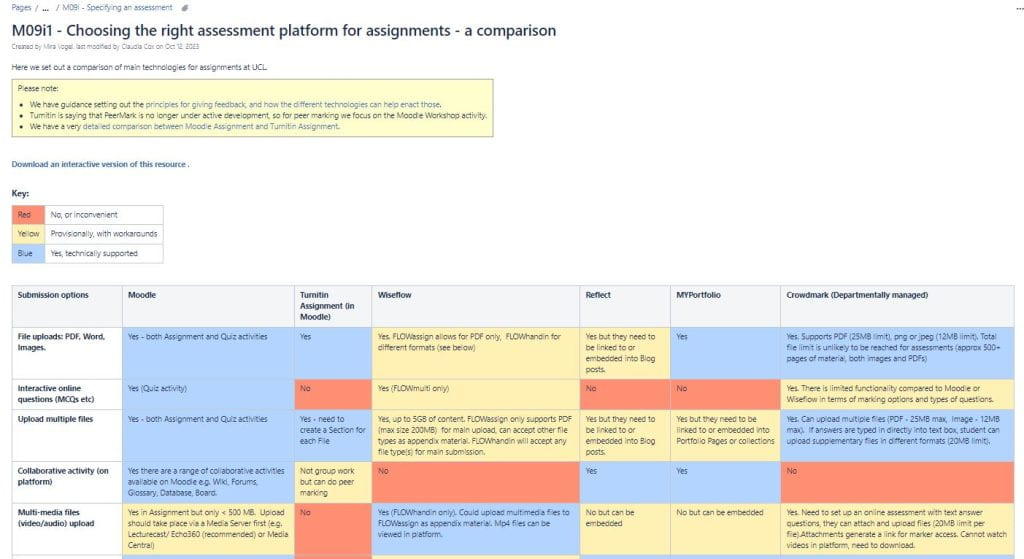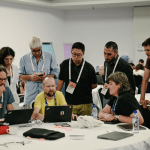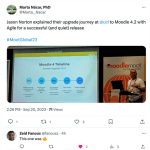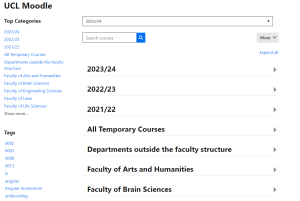Using the Premium version of Equatio with Moodle
By Kerry, on 10 November 2023
Following my post on Using the free Equatio Chrome extension with Moodle, I have finally had the chance to explore how the Premium version works. Currently, UCL has a licence for the Premium version of Equatio for staff and students until July 2024.
Equatio can help you create accessible mathematical content without having to use any code or programming languages. You can easily add formulas and equations to your content through keyboard input, handwriting recognition or voice recording. It is also compatible with LaTeX for more advanced users. In addition, it allows some graphing input.
You may have already explored the free Chrome extension and if not, you can check out our mini guide. While the free version of Equatio can help anyone create accessible maths, it lacks features such as prediction, Equatio Mobile integration, and the screenshot reader. Here is a handy overview of what is included in the premium version compared to the free version.
In case you were not aware (and I only learnt this myself recently), the Premium version of Equatio with unlimited use for Google, Windows and Mac can be installed on any UCL machine. If you would like to try this out when creating Moodle content such as Text and Media areas (formerly Labels), Pages, Books, Discussion Forum messages, Assignment instructions, Quiz questions etc, we have now tested this and created a wiki mini guide.
This will take you through the set up for the Premium version of Equatio for Chrome, the toolbar, setting options and the main features which include the Equation Editor, Handwriting Recognition, Speech Input, LaTeX Editor, Screenshot Reader, Equatio Mobile, Graph Editor, Mathspace and STEM Tools. The mini guide also include links to some handy video guides from Texthelp as well as further information. We hope some of you find it helpful.
Global Deactivation of Portico Mappings
By Tom Walters, on 7 November 2023
Portico mappings on Moodle pages were globally deactivated on 7th November 2023.
Enrolled students will retain access to their Moodle courses.
How will this impact students on my course?
- Students who are already enrolled on a Moodle course WILL continue to have access to that Moodle course.
- Students who join a Module on Portico WILL NOT be automatically enrolled onto the corresponding Moodle course. Students can still be manually enrolled.
- Students who leave the module on Portico WILL NOT be automatically unenrolled.
Moodle and Portico mappings
If Portico mappings are active on a Moodle course, student enrolments on that course are automatically updated overnight to mirror the student registrations in Portico. Consequently, students who change courses or withdraw from their studies are automatically enrolled or unenrolled from the Moodle course when their Portico record is changed. This is desirable when students change/drop modules within the first few weeks of term, however, if students are automatically unenrolled after they have been awarded grades, these grades become inaccessible, which can be very problematic.
Note: the ‘inaccessible’ grades, submissions and logged activity are not deleted. These can be accessed again if the student is re-enrolled manually, however while a student is no longer enrolled on a course, there is no way to view their content.
Why deactivate Portico mappings?
To reduce the likelihood of this particular ‘inaccessible/missing grades’ problem occurring, Portico mappings have been deactivated on all Moodle courses.
For more information about Portico deactivation and why this is done, please see the wiki guide – Deactivating Portico enrolments.
Can I re-activate Portico mappings on my courses?
Doing so may unenrol existing students in error. Before making any changes, please contact us at digi-ed@ucl.ac.uk
The Assessment Matrix Resurrected
By Claudia Cox, on 31 October 2023
The Digital Assessment Team are pleased to announce a new version of the Assessment Matrix tool, which replaces and expands on a comparison table of the main technologies used for assignments at UCL.
Overview of the Matrix
The Assessment Matrix tool is aimed at helping users in the process of designing assessments decide which platform is best suited for delivery. In addition to providing a quick, visual guide of what different platforms can offer online, users can also download an offline, interactive version of this resource and filter assessment options based on their submission, marking and feedback, and administrative needs.
The tool is expected to be relevant to both academics and administrative staff. It will serve as a valuable starting point for discussions that occur after assessments have been aligned with learning outcomes but before they have been fully developed and designed, and before the platform to be used has been finalised. The decision on which platform should be used will also need to consider faculty approach, tools used for formative assessment and other factors.
The new version contains information on the following platforms:
- Moodle assignment
- Turnitin Assigment (in Moodle)
- Wiseflow – the UCL AssessmentUCL digital assessment platform [NEW]
- Reflect – the UCL version of the WordPress blogging service [NEW]
- MyPortfolio – the UCL version of the Mahara eportfolio platform
- Crowdmark – an assessment tool currently used by the maths department [NEW]
The matrix covers assessment submission options (such as type of formats that can be submitted, if group work is possible and text editor options), marking (such as if double or blind marking are available, audio feedback options and inline annotation) and feedback and administrative settings (such reporting, export of content and is it integrated with SITs).

Accessibility
Initial feedback on the Assessment Matrix highlighted the importance of testing resources to ensure they meet accessibility requirements. Originally this was intended to have a ‘traffic light’ design to indicate whether tools met users’ needs for assessment, however due to the limited cell colour range available on the Confluence wiki this would not have met WCAG 2.2.
Using staff recommended tools such as COBLIS and TPGi’s Colour Contrast Analyser are great ways to help ensure that any resources and materials are WCAG compliant and allowed us to find a colour scheme that works for a broader audience of users.
Feedback
Digital Assessment Team has been cautious about overloading the matrix to prevent overwhelming its users. However, they are eager to ensure that the matrix remains as user-friendly as possible. If you spot anything that needs updating or editing please contact the Digital Assessment Team (assessment-advisory@ucl.ac.uk).
If you wish to discuss your assessment approach in more detail refer to the education support contacts in your faculty and department.
UCL Digital Learning Environments at MoodleMoot Global 2023
By Jason R Norton, on 17 October 2023
Between the 18th and the 21st of September, the Moodle (DLE product) team attended the Global MoodleMoot, a coming together of over 700 worldwide Moodle users from education, government, NGOs, Moodle Partners and beyond.
On the pre-conference day, team members attended Developer, UI/UX and Learning Designer “jams”, where they worked with other delegates on issues around lifelong learning challenges within Moodle.
The main conference included presentations on all aspects of Moodle covering developments, product roadmaps, and new functionality from Moodle HQ, Moodle partners and independent vendors. Of course, there were numerous talks about the use of generative AI both in online education and Moodle, including a very interesting keynote by Martin Dougiamas, the founder of Moodle on the future of AI and robots and its impact upon humanity as a whole.
The UCL team gave two presentations: one by the product owner on implementing Agile methodology into the DLE team at UCL, and one by our DLE UI/UX team on improving Moodle through research into the user experience and data analysis.
Our teams presentations are available to watch at the following URLs:
Introducing Agile Practice into the VLE at University College London
Improving Moodle through UX research and data analysis
Our presentations were warmly received with all presenters being approached numerous times over the next few days to discuss aspects of their presentation or to offer insight and support for other Moodle users.
One of the team’s principles is that any developments that we make that can be fed back to the Moodle community should be. Following our UI/UX talk, and discussions in which we announced the release of several plugins, our Senior Team Lead Alistair Spark was semi “mobbed” by other Moodle users seeking to get the repository URLs so they might make use of our developments.
Catalyst IT, our Moodle partner, also won Moodle Contributor partner of the year based significantly on the work that they have developed with us and released back to the community.
Outside of the conference, I also met with the Moodle Quiz Consortium of which UCL is part. Over the last 2 years together, this group of five leading European universities have provided funding for a complete rewrite of the Moodle core question bank.
This has led to a significant enhancement of Moodle’s assessment capabilities, guided by input from the Consortium. The outputs of these developments have and continue to be released into Moodle versions 4.0+. The Consortium leads at Bern University and the Open University presented on the next stage of development and upon the success of the group’s developments so far.
The Consortium is now seeking funding for the next item of quiz bank development, which is the ability to share question banks. This is a high value function that our users would significantly benefit from, as demonstrated by the quote below from one of our senior academics. I hope that we will be able to devote some resource towards this work within this financial year.
“Being able to share questions is essential. At present my main issue is that I have questions in separate courses. If I share them with colleagues, by making a copy, their changes and feedback don’t apply to my questions and we end up having to maintain separate versions of the same questions. As we have 1908 questions in a single course, you can imagine that being able to share these centrally at our category level between tutors and use tag/search on the question is absolutely essential.”
Final comments
As product owner, I personally have come away with three specific contacts that I will be following up. The first was a reach-out from the Moodle (HQ) product owner to arrange a talk with UCL about Moodle. This has now been followed up and the UCL team are having a joint meeting and agenda in December with the Moodle product leadership team.
The second was from members of the European Commission Moodle team who were interested in talking to us on both what we have done with Moodle and the impact of moving to Agile/Scrum.
Thirdly, I had an engaging talks with the product owners of the Moodle Academy which is a Moodle HQ training resource that provides official, free, up-to-date Moodle training packages. I held a discussion with them on how UCL may be able to use the Academy to provide tailored learning pathways for our administrators and tutors. This could lead to a UCL specific badge or a UCL specific variant of the MEC qualification.
And my final takeaway item, and one that I will be talking to my colleagues in the Media Environments product team about, is an LTI for the enhancement of media in Moodle from any source via a product called Annoto. This product enables course participants to add time-based annotations as an overlay to any video content, turning passive video watching into an active and collaborative learning experience while providing actionable insights on the students and the video content delivered by course tutors. One for a shared product review in the future!
Our technical team who were in attendance have likewise made many contacts and expanded their networks with specific institutional contacts as well as the larger Moodle community. They have each come away from various presentations and demonstrations with ideas and suggestions that the team will be discussing over the next few weeks and months that will go into making our UCL Moodle that much better.
The UCL Moodle team continues to have significant and growing standing in the Moodle community, Our presence and engagement at events such as MoodleMoot and release of our developments into the open source community enhance UCL’s reputation.
MoodleMoot has once again provided an exceptionally rich environment for the team to learn, think, develop and connect.
- User Experience Jam
- Developers Jam
- David Kwaw being interviewed
- Jason Norton presenting on Agile/Scrum
- UCl Moodle team with Martin Dougiamas founder/creator of Moodle at the end of conference party
- UCL Moodle UX team Eliot Hoving and Stuart Lamour delivering their presentation
- Product Owner Jason Norton gets some supportive twitter feedback on his Agile presentation
Updating Our Academic Integrity Resources
By Marieke Guy and i.bowditch, on 10 October 2023
In the ever-evolving landscape of higher education, maintaining academic integrity is paramount. Educational institutions are tasked not only with upholding these standards but also with fostering a culture of academic honesty. At UCL the commitment to academic integrity has led to a revamp of existing resources, driven by a desire to offer the most effective support possible.
We recognise that when it comes to guiding students on academic integrity, a punitive approach falls short. Instead, we want to start with positive framing that taps into the broader motivations of students and positions them as valued contributors to an academic community of practice. The institution does not assume that students inherently understand these practices or that violations should always result in punishment. Rather we view the key causes of plagiarism as opportunities for learning and growth. For instance, Turnitin, a well-known plagiarism detection service, is seen as a tool to assist students in learning rather than merely as a plagiarism detector.
Review and Refresh
At the end of last year, the Digital Assessment Team carried out an audit of academic integrity resources at UCL, which uncovered the need for a refresh. This need became even more pronounced with the advent of Generative Artificial Intelligence (AI). We have now completed the review and refresh of our academic integrity resources for the academic year.
Turnitin Similarity Checker
One of the longstanding resources, the “Plagiarism and Academic Writing for Students” course, has served UCL for over a decade. This course primarily allows students to check their assignments for plagiarism by generating a similarity report through Turnitin. The assignments are not added to the institutional repository, and the course is reset regularly.
The course has now been streamlined to focus solely on explaining Turnitin’s purpose and guiding students on how to create and use the similarity report. An introduction from Ayanna Prevatt-Goldstein, Head of UCL Academic Communication Centre, has been added to give context on how use of Turnitin relates to good academic practice.T o provide a comprehensive experience, an additional section now offers links to other UCL resources related to academic integrity. These are:
- Academic integrity hub – A student-facing hub area for all guidance on academic integrity including links to information on academic misconduct, academic misconduct panels and Frequently Asked Questions.
- UCL Academic Communication Centre – The UCL Academic Communication Centre (ACC) supports UCL students to develop their academic language and literacies. We assist students of all language backgrounds, across faculties, at all levels of study, to communicate more effectively in their discipline.
Understanding Academic Integrity Course for Students
UCL has also recently released an updated version of the Understanding Academic Integrity course for students, now hosted on the primary UCL Moodle site: the course previously sat on the UCL Extend platform. This course aims to educate students about all aspects of academic integrity and covers:
- How much do I know about academic integrity?
- What is academic integrity?
- Acknowledging the work of others
- Using collaboration positively
- Contract cheating
- Artificial Intelligence and Academic Integrity
- Check your understanding of academic integrity and academic good practice
The revised course content has been built collaboratively with staff and students and incorporates insights from academic integrity and academic writing experts at UCL. It addresses emerging concerns like the use of Generative AI in academia and the course features various elements, including short videos, reflective activities, quizzes, and a final certification quiz.
Students can self-enrol for the course and on completion of all required activities and a success rate in the quiz will receive a certificate of completion, which can serve as evidence of their commitment to academic integrity and be shared with their tutors.
At the start of the course students are asked to post their responses on a mentimeter activity asking ‘Why do you think students don’t always act with academic integrity?’ . These are the results so far (mid October 2023, 1011 participants, 2547 votes):
To ensure that academic integrity remains current, UCL has devised a plan for annual course refreshers. Annual refreshers are particularly important in the evolving context of Generative AI. Course content on GenAI and its relation to academic integrity will need to be revised in line with both technological and policy developments in this area.
Course video on Artificial Intelligence and Academic Integrity
Older versions of the course are archived to maintain access to logs if needed for academic misconduct panels. In cases where students may still access the previous Extend version, a notice redirects them to the new version on Moodle.
As UCL continues to evolve its approach to academic integrity, it exemplifies a commitment to not just maintaining standards but enhancing the support and resources available to students. This proactive approach ensures that UCL students are well-equipped to navigate the complexities of academic integrity while upholding the institution’s values of learning and growth.
Moodle upgrade and course format UX project
By Eliot Hoving, on 9 October 2023
The Digital Learning Environment (DLE) Moodle UX (User Experience) team would like to wish staff and students an excellent start to the 2023/24 academic year.
By now, many of you will have noticed that UCL Moodle has been given a much-needed update. Student and staff feedback has been overwhelmingly positive. Nonetheless, the Moodle UX team is continuing to develop UCL Moodle based on UX research, accessibility requirements and user feedback.
UCL Staff can receive early access to developments and participate in opportunities to feedback and shape UCL Moodle by joining the Moodle Development User Feedback Teams group. Alternatively, you can email questions and feedback to digi-ed@ucl.ac.uk
There are a few quick steps we recommend staff take to update their course to make the most of the new look of Moodle and its new features. You can read about them in the Moodle 4 – Quick tips for updating your course guide.
The why about Moodle text editor changes
As part of the upgrade to UCL Moodle, the ability to change font colour and font family has been removed from Moodle’s text editor.
Font colour has been removed to encourage content in Moodle to meet accessibility requirements. This is in response to feedback from students who have reported that text on Moodle has often been formatted with poor colour contrast (e.g. red text on a white background) or that colour has been used to indicate information which is not accessible (e.g. conveying information solely using green or red colours). For further guidance, you can read the Digital Accessibility team’s guide on the Visuals and the use of colour.
Changing font family has also been removed to avoid text that breaks UCL’s design system. Keeping text to a consistent font family will make it easier for students to read content and will also support a consistent and improved experience across UCL’s many webpages and applications.
Upcoming changes to UCL Moodle theme
We’d also like to update you on some upcoming changes which should come into effect soon.
1 – New banner and navbar
The UCL logo banner and navbar has been redesigned to align Moodle to UCL’s new design system and to conserve vertical space. This should make Moodle more accessible and improve useability on smaller screens and mobile devices.
Old banner
New banner
2 – New course index page
The course index page is where staff and students can search or browse for courses. This page has been redesigned based on UX interviews with staff. The new design removes unnecessary information and should be easier to use.
Old course index page
New course index page
3 – SCORM package default setting changes
Based on user feedback and an analysis of how SCORM packages are used at UCL. The following changes are planned to the default settings of SCORM packages:
- Disabled Preview Mode set to “Yes”
- Display Course Structure in Player set to “Disabled”.
We expect these changes to save users’ time when creating new SCORM packages. The changes will not impact already existing SCORM packages, and the default settings can always be changed when creating a new SCORM activity if required.
Course format UX project
The Moodle UX team is currently working on wrapping up the Moodle theme development (for now), with a specific focus on improving and embedding accessibility.
Once complete, we will start working on a UX research project on Moodle course formats. Moodle course formats control how content is structured within a course (e.g. topics, weekly topics, tabs, flexible format, grid). We will be interviewing staff and students to better understand how different course formats are used. Based on the findings, we aim to build a bespoke UCL Moodle course format that fulfils UCL student and staff needs and builds on the best elements of other Moodle course formats.
If you are interested to find out more or participate in this research, please email e.hoving@ucl.ac.uk.
 Close
Close















